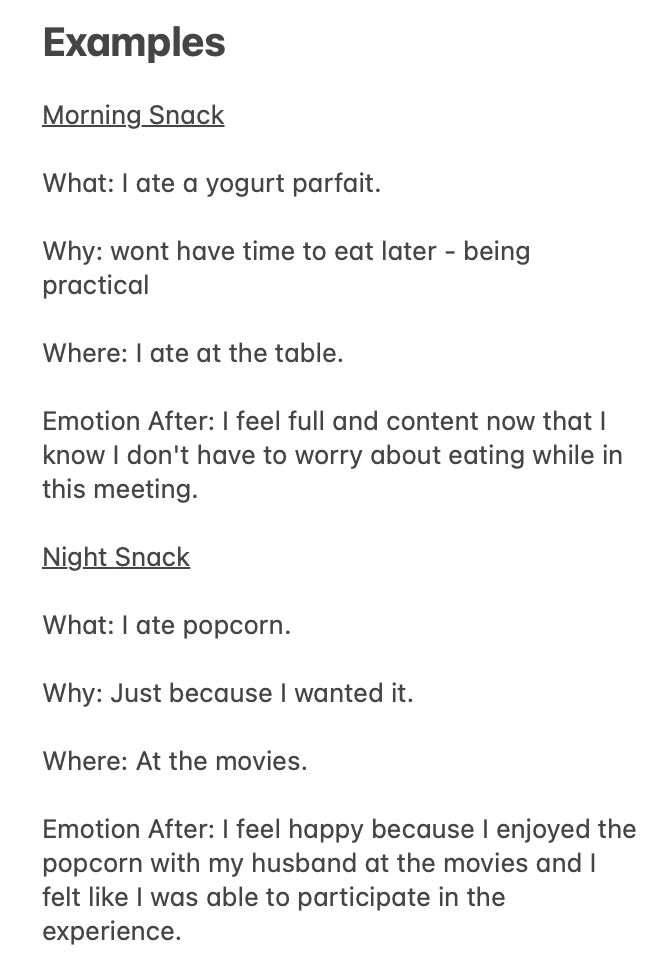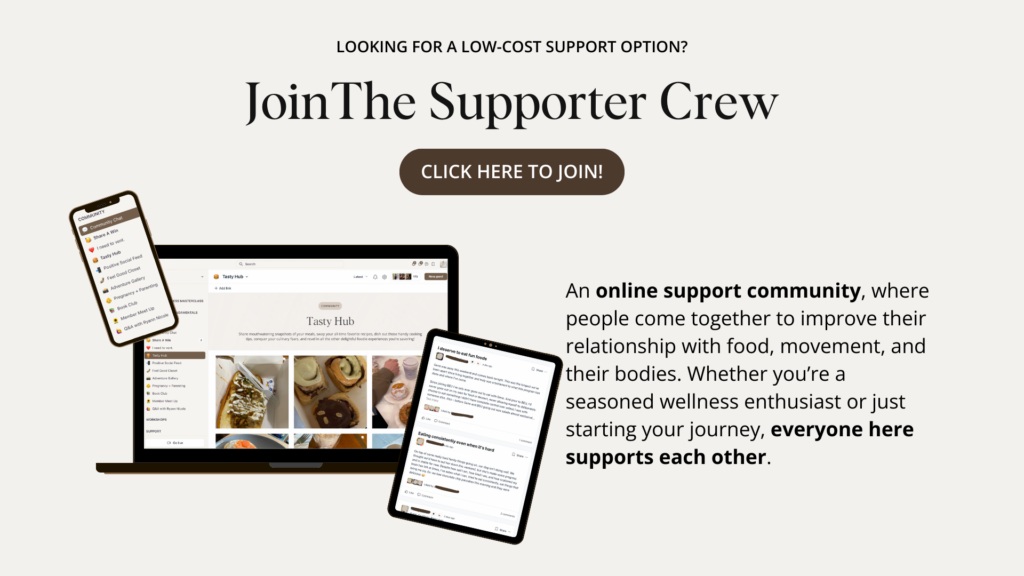How To Overcome Binge Eating Without Going To Therapy

Written By:
Category:
Ryann Nicole
**Disclaimer: This is not saying don’t go to therapy, but if it’s not financially accessible to you at this moment, here are things you can do!
Struggling with binge eating can feel overwhelming, but there are effective self-help strategies for binge eating you can implement without needing to attend therapy sessions. Overcoming binge eating is possible with the right approach and mindset. In this blog, we’ll explore practical tips and techniques to help you regain control over your eating and develop a healthier relationship with food, all without the need for professional therapy. Let’s dive in and discover how you can take charge of your eating habits starting today.
Educate Yourself
First, try to learn more about binge eating. You can do this by reading good books, articles, and other trusted sources that talk about the feelings and thoughts behind binge eating. Knowing more about it can really help you as you work to get better. I highly recommend starting with:
Intuitive Eating by Evelyn Tribole and Elyse Resch:
This book teaches you to listen to your body’s natural hunger and fullness cues rather than following strict diets or food rules. It encourages you to trust your body’s signals and eat in a way that feels good and satisfying to you. For example, instead of counting calories, you might focus on eating when you’re hungry and stopping when you’re full, choosing foods that nourish you and bring you joy.
Anti-Diet by Christy Harrison:
This book challenges the diet culture and the harmful messages it sends about weight and health. It encourages you to reject dieting mentality and embrace body acceptance and self-care. For instance, instead of striving for a certain body size or shape, you might focus on practicing self-compassion and engaging in activities that support your well-being, regardless of your weight.
Life Without Ed by Jenni Schaefer:
This book personifies the eating disorder (ED) as “Ed” and helps you separate your identity from the disorder. It offers strategies for overcoming the voice of the eating disorder and developing a healthier relationship with food and your body. For example, instead of letting the eating disorder control your thoughts and behaviors around food, you might learn to challenge and confront “Ed” to regain control over your life and your eating habits.
Reading these books can help you gain insight into the psychological and emotional aspects of binge eating, empowering you to make positive changes toward recovery. Remember, knowledge is a powerful tool on your journey to healing.
Keep a Food Log
To help understand your eating habits better, try keeping a food log. Don’t worry, this isn’t about counting calories. Since you might not have a therapist to help, this log can show you patterns in your eating.
How To Keep A Non-Triggering Food Log
- List what you ate without getting too detailed. For example, just say “breakfast sandwich” instead of listing every ingredient.
- Write down why you’re eating.
- Note how you ate, like if you were watching TV or sitting at a table.
- Write down how you felt after eating.

This can show you what triggers your binge eating, any patterns you have, and how your emotions affect your eating. Being aware of these things is the first step toward getting better.
Establish Regular Eating Patterns
To get your eating habits consistent if binge eating has made things chaotic, it’s important to establish regular eating patterns. This means having a routine where you eat three satisfying meals and snacks if you need them, making sure you don’t go more than four hours without eating, even if you’re not feeling hungry. Having a regular eating schedule helps stop harmful dieting habits that can lead to binge eating, like skipping meals or not eating enough. It also helps you concentrate better, feel more energetic, and be healthier overall. Here’s how you can plan your meals and snacks:
- Have your first meal at 7am, a snack at 10am, lunch at 1pm, another snack at 4pm, dinner at 7pm, and if you need it, another snack at 10pm.
- Eat your first meal at 8am, another meal at 12pm, a snack at 3pm, your third meal at 6pm, and if you’re hungry, have another snack at 9pm.
- Start your day with a snack at 5am, then have your first meal at 9am, another meal at 1pm, a snack at 4pm, your last meal at 7pm, and if you’re still hungry, have another snack at 10pm.
By sticking to these regular eating patterns, you can help your body get back to normal and reduce the chances of binge eating.

Challenge Unhelpful Thoughts
When dealing with binge eating, it’s common to have a critical voice inside your head. But it’s time to change that mindset. Start challenging thoughts that aren’t helpful to you. This can change how you feel and act around food. By questioning these thoughts, you can change how you see food and your body, which helps stop binge eating. Think of it like rewiring your brain to be more positive. Here’s how to do it:
- Awareness: Notice when you’re thinking negative thoughts about food or your body.
- Questioning: Ask yourself if these thoughts are really true or just assumptions.
- Alternative Perspectives: Try to see things from a more positive point of view.
- Evidence Gathering: Look for proof that goes against these negative thoughts.
- Realistic Evaluation: Decide if these thoughts are fair to yourself.
Examples
Negative Thought: “I’ll only be happy if I lose X pounds.” Challenge: “Is it really true that losing weight is the only way to be happy? Could taking care of yourself in a loving way, rather than focusing on weight, bring you happiness?”
By challenging these negative thoughts, you can start to change your mindset and break free from binge eating habits.
Identify Triggers and Coping Mechanisms
If you’re wrestling with binge eating, it’s not the binge you crave but the emotional relief it brings—whether it’s a high, numbing effect, or a distraction. Even though you know binging leaves you feeling worse, emotions tend to override logic. To break free, learn to manage tough emotions without relying on food.
Having different ways to cope is vital to break the cycle of using food as the go-to comfort. Diversifying coping mechanisms broadens your toolkit for handling stress, emotions, and challenges, reducing the need for binge eating. By exploring various coping skills, you gain more control over your emotional well-being, minimizing the reliance on destructive eating patterns.
Seek Support from Friends and Family
Fighting binge eating can make you feel alone. But having support is really important—it helps you feel less lonely, gives you emotional support, and helps you with practical things.
➡️ Click Here For A Free Support Group!!
A support system can help you feel less isolated when you’re dealing with disordered eating. It gives you emotional support and makes you feel better about yourself, even when you’re feeling bad. Getting practical help from professionals, friends, or people going through similar things can also make it easier to recover from binge eating.
Self-help strategies for binge eating are a thing. You can do it by learning more about binge eating and looking into all the free things you can. It’s important to know that getting better takes time, and getting support from friends, family, or online groups can really help. If you’re not seeing the progress you want or if you’re still struggling, I highly recommend talking to a doctor or therapist for more help.
Must-Read Books To Improve Your Relationship With Food
Just so you know, I do review everything I recommend. When you buy through links on this page, I may earn a commission.
Intuitive Eating by Elise Resch and Evelyn Tribole
When it was first published, Intuitive Eating was revolutionary in its anti-dieting approach. The authors, both prominent health professionals in the field of nutrition and eating disorders, urge readers to embrace the goal of developing body positivity and reconnecting with one’s internal wisdom about eating―to unlearn everything they were taught about calorie-counting and other aspects of diet culture and to learn about the harm of weight stigma.
Health At Every Size by Lindo Bacon
Fat isn’t the problem. Dieting is the problem. A society that rejects anyone whose body shape or size doesn’t match an impossible ideal is the problem. A medical establishment that equates “thin” with “healthy” is the problem. The solution? Health at Every Size. Tune in to your body’s expert guidance. Find the joy in movement. Eat what you want, when you want, choosing pleasurable foods that help you to feel good. You too can feel great in your body right now—and Health at Every Size will show you how.
Anti-Diet by Christy Harrison
In Anti-Diet, Christy Harrison takes on diet culture and the multi-billion-dollar industries that profit from it, exposing all the ways it robs people of their time, money, health, and happiness. It will turn what you think you know about health and wellness upside down, as Harrison explores the history of diet culture, how it’s infiltrated the health and wellness world, how to recognize it in all its sneaky forms, and how letting go of efforts to lose weight or eat “perfectly” actually helps to improve people’s health—no matter their size. Drawing on scientific research, personal experience, and stories from patients and colleagues, Anti-Diet provides a radical alternative to diet culture, and helps readers reclaim their bodies, minds, and lives so they can focus on the things that truly matter.
Just Eat It by Laura Thomas
With a perfect blend of scientific expertise and relatable anecdotes, the author dismantles societal myths around food and body image. Through practical advice, self-reflection exercises, and a touch of humor, Thomas equips readers with the tools to break free from the cycle of diet culture, promoting self-love and nourishment. This book is an essential companion for anyone seeking to redefine their approach to food, fostering a positive and sustainable lifestyle.
Ryann Nicole
Licensed Therapist, Certified Nutritionist, and Virtual Wellness Coach
Ryann is a licensed therapist and virtual wellness coach who has assisted individuals worldwide in establishing a healthier relationship with food and their bodies.
Are You Ready to Heal Your Relationship With Food?
I understand—it can be overwhelming to figure out where to begin. Let's simplify things and have you start right here:
Why Am I Overeating?
First Steps To Stop Binge Eating
The Food Freedom Lab Podcast
FREE QUIZ
FREE GUIDE
Podcast
the food freedom lab podcast


